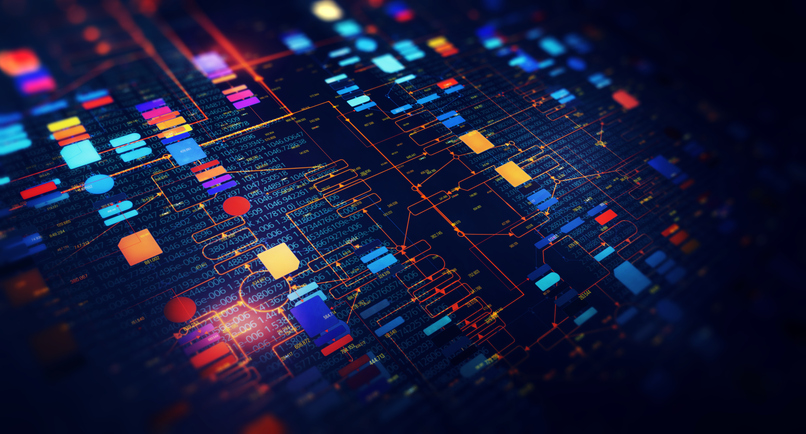Written by Scott Wilson

Other than the fact that both technologies were almost immediately turned into buzzwords and memes by the social media crowd, it’s not immediately obvious what kind of relationship there could be between artificial intelligence and cryptocurrency.
In fact, some of the articles about AI and the blockchain read like they were written by a chatbot—and probably they were. Meaningless strings of grammatically correct keywords are strung together encouraging readers to buy the latest AI-powered crypto coin with illuminating names like:
- Scotty the AI
- Sponge V2
- Meme Kombat
- eTukTuk
Like most crypto schemes, they are primarily designed to separate investors from their real-world money and line the pockets of those who bought before. In many cases, there is nothing recognizably related to artificial intelligence in the offering. In others, buying in theoretically opens up access to AI-powered trading tools.
Behind the hype, though, the blockchain tech that cryptocurrencies are based on may have an important role to play in artificial intelligence… and AI will certainly change the world of cryptocurrency.






AI Presents Threats and Opportunities in the Blockchain World
 At heart, blockchain-based technologies are about delivering information and services independent of any existing legal or regulatory structures through cryptographically-validated exchanges.
At heart, blockchain-based technologies are about delivering information and services independent of any existing legal or regulatory structures through cryptographically-validated exchanges.
These systems offer a lot of autonomy for securing contracts, tracking goods in transit, and verifying identity. They build in the ability for any individual or organization to establish the reality of performance and delivery without reference to outside agencies.
For example, smart contracts can be made with blockchain systems to self-execute. An RFID tracker is observed at a delivery location, automatically sending payment through the system to the originator.
Of course, the most popular use for blockchain technology to date has actually been on the payment side: it is used to provide stable and secure backing for transactions between anonymous individuals as the base of many kinds of cryptocurrencies.
While crypto is seen by many as simply a kind of investment, at heart it represents an ambitious effort to detach financial transaction management from corporations and governments. Artificial intelligence may be able to help—or utterly destroy—crypto.
AI Could Carve Through Cryptocurrency Defenses Like Butter
 AI represents a significant threat to cryptocurrencies and to cryptography in general.
AI represents a significant threat to cryptocurrencies and to cryptography in general.
Attacks on modern cryptographic systems are traditionally considered so computationally intensive as to be impractical. A modern supercomputer cranking at full bore might get through all possible key combinations in something like 5,000 times the age of the universe.
AI may change that equation, however. Unlike conventionally programmed attacks, AI brings additional reasoning and exploratory skills to attempting to find the inverse function of cryptographic algorithms. That would allow reversing the tool and decrypting what once was hidden.
For any cryptocurrency, the very ability to crack it causes the entire system to collapse. There’s no way left to trust it.
AI Might Also Armor Crypto Systems With Impervious Protection and Make It More Useful Than Ever
 There’s no reason that AI would be relegated to only attacking crypto, however. The same super-powers that make it ideal for doing so could be used to deliver newer and more secure cryptocurrencies. AI is already being used to boost cybersecurity by providing smarter attack detection and broader surveillance abilities.
There’s no reason that AI would be relegated to only attacking crypto, however. The same super-powers that make it ideal for doing so could be used to deliver newer and more secure cryptocurrencies. AI is already being used to boost cybersecurity by providing smarter attack detection and broader surveillance abilities.
AI is also, of course, a way to make smart systems even smarter. The potential for blockchain execution to take on more complex tasks and fulfill more challenging work when executed by AI could be a big boost for those systems.
Currently, blockchain tech like Ethereum comes with the ability to embed programs in the chain itself. When pre-programmed conditions are met on the chain, the program executes—delivering whatever kind of work or payment has been coded in.
Imagine that program is instead an AI agent. The capabilities of the kind of work delivered would be dramatically expanded.
Of course, so would the opportunity for ambiguity and outright error. A hallucinating AI agent might not fulfill the terms of such contracts in the way that anyone expected. Much progress will have to be made in reliability and predictability for AI tools to give a boost to blockchain contracts.
How Blockchain and the Crypto World Can Give the AI Industry a Boost
 At the moment the blockchain world seems more excited about the potential of artificial intelligence than the AI world is about blockchain. The real interesting use cases combining them may offer more benefits for AI, however.
At the moment the blockchain world seems more excited about the potential of artificial intelligence than the AI world is about blockchain. The real interesting use cases combining them may offer more benefits for AI, however.
That’s because one of the major obstacles for artificial intelligence today is trust.
Most AI models today, particularly the hot generative pretrained transformers that are powering chatbots and image generators, are effectively black boxes. Once trained, it’s almost entirely impossible to determine why they make any specific choice… any given word choice or pixel placement is untraceable through the logic of the model.
That can make them hard to trust for important tasks or decisions.
Complicating matters further is the tendency for these models to engage in what AI researchers call hallucinations: to invent outright or twist their responses in ways that don’t reflect reality. When it is a chatbot claiming that Gandhi was the first man on the moon, it’s funny. When it’s a medical diagnostics system claiming a perfectly health patient has Stage IV cancer, it won’t seem like much of a joke.
AI Training Systems Suffer From Trust Issues, Too
 Related to trust issues is the matter of training data.
Related to trust issues is the matter of training data.
Modern AI requires a lot of it. According to estimates, ChatGPT was trained on some 45 terabytes of text data. The sources included Wikipedia, books, newspaper articles, science journals, and random internet websites.
AI companies have claimed this represents fair use of the material, in the same way that any other individual can freely read and learn from these open publications. But lawsuits from the New York Times and other publishers dispute this interpretation. And the eagerness of companies like OpenAI to nail down licensing deals with publishers suggest they may also acknowledge that their use of open data is inappropriate.
Going forward, that’s going to be a problem in developing new models. Unless someone can find a way to securely verify and license data for AI training.
Can Blockchain Verification Solve the Trust and Hallucination Problems for the AI Industry?
 This is where blockchain technology comes in.
This is where blockchain technology comes in.
Designed entirely to establish solid, cryptographically-secure trust relationships within an independent web of information, blockchains offer at least theoretical solutions to some of these big AI issues.
Publications that incorporate blockchain verification could use that to verify whether or not their data ended up in training models for AI. And AI companies could use blockchain tracking to validate their rights to training data before turning algorithms loose on it.
Within machine learning systems, blockchain technology could offer a way to track decision making and record considerations at various points in the neural network analysis. That could go a long way toward helping AI researchers build validation and trust into those systems.
More Trustworthy AI Means More Accepted AI Everywhere
 Some within the cryptocurrency community see further applications for crypto in turning AI into a distributed system.
Some within the cryptocurrency community see further applications for crypto in turning AI into a distributed system.
The computational expense of training AI has already put it out of reach for many small organizations or open-source efforts. Most major players in the industry either own major data centers and server farms full of compute, like Google and Amazon, or have deals with other big data center players like OpenAI has with Microsoft for Azure computation time.
Crypto advocates see a future where distributed computing on home devices can be used for AI training instead. In the same way that early Bitcoin mining was conducted on home computers and paid for by the coin itself, they see individuals essentially renting out their home computers to AI training and being paid for the time through cryptocurrencies.
Of course, not even Bitcoin is primarily mined through such distributed efforts anymore, so it’s an open question why AI would be any different.
Is There a Cryptocurrency Solution to the Ultimate AI Problem?
 It’s called the alignment problem, and it’s the ultimate challenge in widespread use of artificial intelligence.
It’s called the alignment problem, and it’s the ultimate challenge in widespread use of artificial intelligence.
The difficulty of getting AI to perform tasks in ways that line up with human needs and expectations is enormous. Big AI companies have loads of very smart people with PhDs in AI working on it, but there’s no obvious solution.
But what if AI motivations were cryptographically bound at the deepest levels to digital currencies? What if, like humans, they could be motivated by financial means? And if the financial incentives were aligned with human economic systems, wouldn’t AI then have a vested interest in supporting those systems?
It’s a wild idea, but it’s a way that cryptocurrency could be relevant in the most important possible way in AI development.
Both AI and Blockchain Development Count on the Same Kind of College Education
 For anyone interested in working at the intersection of crypto and artificial intelligence, you’ll be happy to know that the educational background required is more or less the same in both fields.
For anyone interested in working at the intersection of crypto and artificial intelligence, you’ll be happy to know that the educational background required is more or less the same in both fields.
Like machine learning algorithms and other advanced computer science techniques for AI, cryptography is heavily rooted in mathematics. While no university actually offers a degree in cryptocurrencies, most of the people working in the space have advanced degrees in areas like:
- Finance
- Computer Science
- Physics
- Statistics
- Mathematics
You can add artificial intelligence to that list now that many universities offer programs like a Master of Science in Machine Learning or a Professional Master of Science in Computer Science sub-plan in Numerical Computation.
Either of these programs will include the kind of hardcore statistics and math background required for a solid understanding of cryptography. Applied in another direction, it will also give you what you need to put together artificial intelligence systems.
The particular applications of crypto and AI in the blockchain space also argue for education in fields like:
- Cybersecurity
- Economics
- Accounting
You may also consider earning something along the lines of a Graduate Certificate in Artificial Intelligence if you already have an advanced degree in a related field. These programs build on prior education with the specific training in algorithm development, deep neural networks, and AI training you need to succeed in the field.
Combining blockchain and artificial intelligence is a speculative project at best. Yet if it succeeds, it will be because highly educated experts come together to make the most of both fields at once.





